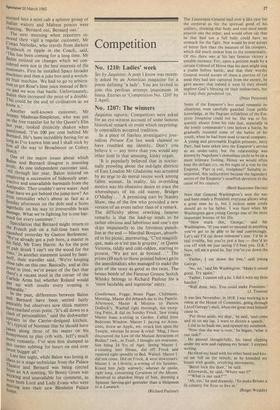No. 1207: The winners
Jaspistos reports: Competitors were asked for an eye-witness account of some famous historical remark or event which surprising- ly contradicts accepted tradition.
In a piece of fearless investigative jour- nalism Private Eye last week claimed to have rumbled my identity. Don't you believe it — any more than you would any other item in that amusing, kinky organ.
'It is popularly believed that in noctur- nally prowling about the red-light districts of East London Mr Gladstone was actuated by an urge to do moral rescue work among fallen women. In reality, his overriding motive was his obsessive desire to trace the whereabouts of his old nanny, Bridget O'Malley .. A promising start by Stanley Shaw, one of the few who provided a new version of an event rather than of a remark. The difficulty about rewriting famous remarks is that the lead-up tends to be rather obvious and laborious and one's eye skips impatiently to the frivolous punch- line at the end — Marshal Bosquet, absorb- ed in his picnic, murmuring, 'C'est magnifi- que, mail ce n'est pas le gruyere,' or Queen Victoria, tiddly and cold-ridden, starting to protest, 'We are not as boozed...' The prizes (£9 each to those printed below) go to the anecdotalists who managed to make the grist of the story as good as the twist. The bonus bottle of the Famous Grouse Scotch Whisky belongs to Richard Parlour for a `most laudable and ingeniose' entry.
Candlemass. Fogge. Roast Pigge. Chilblanes. Morning, Master did debauch me in the Pantrie. Afternoon, Master & Mistress to Parson Dedlock's. Washed right thorough, not excep- ting Feete, & did on Sunday Frock. Saw young Master Isaac a-sitting in Garden. Called from Bedroom Window. Master 1. paying no Atten- tions, threw an Apple, wh. struck him upon the Temple, whereat he arose & cried: 'Meg, I have discouered the Law of the Mutual Attraction of Bodies!' (wh., in Truth, I thought not oversoon, him being 24 Yrs of Age). Seeing Master I. a-running into House, did off Frock and repaired right speedily to Bed. Waited. Master I. did not come. Did on Frock, & went downstairs: Master I. in Librarie, a-writing of his Summes. Kissed him fully warmely; whereat he spoke, right long, concerning Gyrations of the Moone. Resolved to abandon Hope of him, deeming a Spinster Serving-girl genteeler than a Helpmeet to a Lunatick.
(Richard Parlour)
The Lieutenant-General had ever a like care for the corporal as for the spiritual good of his soldiers, thinking that body and soul must needs nourish one the otter; and would often say that he that had not a full belly could have no stomach for the fight. Nor would he ever accept of better fare than the meanest of his troopers, which did much endear him to the commonalty. Of this there was at-his late famous victory a notable instance. For, upon a petition made by a certain Colonel of Horse that his men might sing a psalm before battle, and that their worthy General would accept of them a portion of rye meal they had late captured from the enemy, he gave answer that indeed it were fit they should implore God's blessing on their endeavours, but to keep their powdered rye.
(Peter Peterson) Some of the Emperor's less usual romantic in- clinations were carefully guarded from public knowledge, as the flagrant infidelities of the Em- press Josephine could not be. She was so fre- quently absent from his side that, especially in the lonely commander's tent before a battle, he gradually resumed some of the habits of his youth, when he had been used to naval company. A young and personable English prisoner, Jerry Parr, had been taken into the Emperor's service as an under-valet; but the relationship was known by Napoleon's immediate circle to be on a more intimate footing. Hence we would often hear the defiant cry, on the night of a visit by the Empress, 'Parr ce soir, Josephine!' Suitably in- terpreted, this indiscretion became the legendary motto of the Emperor's unselfish devotion to the cause of his country.
(Basil Ransome-Davies) Now that General Washington's won the war and been made a President everyone allows what a great man he is, but I reckon some credit should go to his father. 1 was there when Mr Washington gave young George one of the most important lessons of his life.
"Now mark this, George,' said Mr Washington, 'If you want to succeed in anything you've got to be able to lie real convincingly. Let's say I'd cut down someone's tree. I'd be in real trouble, but you're just a boy — they'd let you off with me just saying I'd beat you. O.K.? Now, tell me a good lie. Say you've cut down the tree.'
'Father, I cut down the tree,' said young George.
`No, no,' said Mr Washington. 'Make it sound good. Try again.'
'Father, 1 cannot tell a lie. I did it with my little hatchet.'
'Well done, boy. You could make President.' (J. Timson) It was late November, in 1918. I was working in a room at the House of Commons, going through Lloyd George's mail, when the great man himself came in.
`Put those aside, my dear,' he said, 'and come and sit on my lap. I want to dictate a speech.'
I did as he bade me, and opened my notebook. `Now that the war is over,' he began, 'what is our task?'
He paused thoughtfully, his hand slipping under my arm and cupping my breast. I stopped writing.
He tilted my head with his other hand and kiss- ed me full on the mouth, as he kneaded my breast with gentle, revolving movements.
'Better lock the door,' he said.
Afterwards, he said, 'Where was I?'
"'What is our task?"' `Ah, yes,' he said dreamily. `To make Britain a fit country for Eros to live in.' (Roger Woddis)


































 Previous page
Previous page